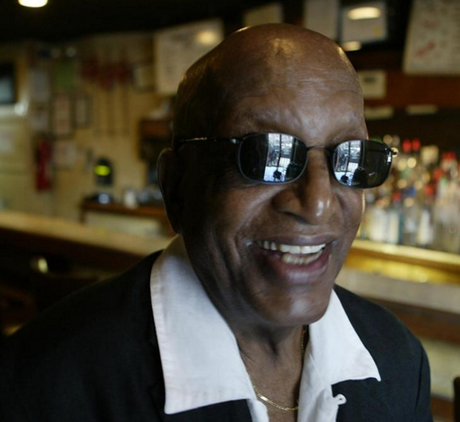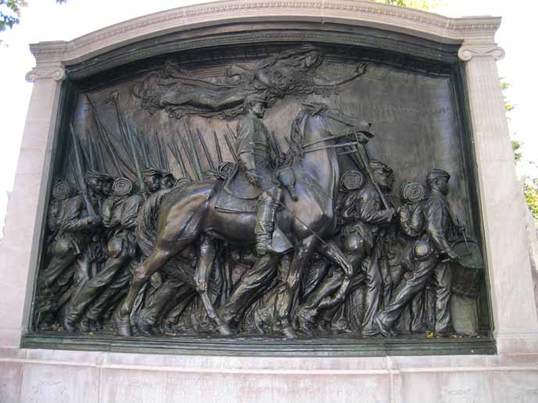|
He was a barber to the stars, and won a Purple Heart during World War II. He lived to be 104 years old before passing away last December 2015. We will the late James Guildford, Jr. at the March 3, 2016 Black History Breakfast. Lest we forget.... ======================== Article Source: The Boston Globe by Byran Marquard A master barber, James E. Guilford Jr. was a stylist to stars of a storied era in Boston jazz, when a shave and a trim cost barely a buck at his Tremont Street shop. He could also spin stories as elegant as the fine lines that filled his sketchpads after he traded scissors and razor for the pen and a paintbrush of an artist later in life. Mr. Guilford, who died in December 2015 at 104, liked to tell how singer Billie Holiday performed a run of shows at Boston’s famed Storyville club in April 1959 “and gave beautiful performances. I was there every night.” After Holiday’s Saturday show, less than three months before she died, a party was thrown in her honor at another Boston club and “I drove her from Storyville in my Cadillac,” he recalled in a 2005 Globe interview. “She was wearing all black. Her lips were black and her nails were black. We were sitting at a table with about 10 people having cheese and crackers, and they wanted her to sing, and she says to me, ‘Jimmy, what do you want to hear?’ I said, ‘Well, “Lover Man,” ’ and she got up, took the mike, and sang it right next to where she’d been sitting.” A Roxbury resident since birth, Mr. Guilford was the oldest living graduate of Boston Latin School when he died in the Laurel Ridge care facility in Jamaica Plain after his health failed. He began barbering at age 12, cutting hair from 1923 to 1979, and he was awarded the Purple Heart after being injured while serving as an Army sergeant during World War II. When the war ended, he returned to his Roxbury barbershop. “People who were traveling could always come to Boston if they wanted their hair done and have a do. They could come to Jimmy Guilford’s hairstyling salon,” he said in an interview for the WGBH program “Basic Black.” “I had acquired quite a name where I was called ‘the hairstylist to the stars,’ ” Mr. Guilford said. “In my business were such stars as Sugar Ray Robinson and Duke Ellington. Nat Cole and Oscar Peterson. I even did Sammy Davis’s father, but Sammy, he did his own hair. A lot of show people that came to Boston came to me.” Over the years he also sold real estate before devoting much of his time to art. His portrait of the Rev. Martin Luther King Jr. was unveiled in January 1982 in the Central Square branch of the Cambridge Public Library, when Mr. Guilford was 70. “I think the creative part that comes along with being a hairstylist started to express itself on canvas,” said his daughter Marsha Guilford Davenport of Owings Mills, Md. “My home is filled with his artwork. He’s worked in every medium – charcoal, acrylic, watercolors, oil. He even does pen and ink sketches. Art is just something that blossomed in him.” One of four children, James Edward Guilford Jr. was born Oct. 7, 1911, in a third-floor apartment in Roxbury. “He would tell you he grew up in what they called a cold water flat,” his daughter said. His father, James Sr., was from Petersburg, Va. His mother, the former Nannie Belle Haskins, was from Lynchburg, Va. At Boston Latin, Mr. Guilford was the only African-American on the track team in 1926 and was part of a relay squad that set a record while defeating Boston English in late March. His teammate fell behind on the first leg, “but on the back stretch of the second lap James Guilford of Latin passed M.I. Linsky of English and handed over a four-yard margin,” the Globe reported. Latin’s anchor runner held on to win by inches. The Black History Month Breakfast will be held on Thursday March 3, 2016 at the Boston Colonnade Hotel from 8:30 am to 11:00 am.
0 Comments
Perhaps you saw the award winning movie, “Glory” when it debuted in 1989 or later on DVD or On Demand. Starring Denzel Washington, Matthew Broderick and Morgan Freeman, the film celebrates the heroic efforts of one of the first all Black regiments during the Civil War. The Massachusetts 54th Regiment victories came at a heavy price, including the death of their White commander, Colonel Robert Gould Shaw who died during the 1863 attack of Fort Wagner, South Carolina. The men who fought and died helped to ultimately win the Civil War, and their struggles, setbacks and amazing levels of courage should never be forgotten.
I often pass the monument that was erected on Beacon Street in Boston across from the Massachusetts State House. It pays tribute to the men of the 54th who fought, lived and died so that ultimately all men and women could be free in America. As we close out our tribute to Memorial Day, we pay tribute those who sacrificed their lives in all wars fought by Americans. We pay a special tribute to the Civil War era men of the Massachusetts 54th Regiment. Read More About Them Below… -Carole Copeland Thomas ======================= The Massachusetts 54th Regiment The Robert Gould Shaw and Massachusetts 54th Regiment Memorial, located across Beacon Street from the State House, serves as a reminder of the heavy cost paid by individuals and families during the Civil War. In particular, it serves as a memorial to the group of men who were among the first African Americans to fight in that war. Although African Americans served in both the Revolutionary War and the War of 1812, northern racist sentiments kept African Americans from taking up arms for the United States in the early years of the Civil War. However, a clause in Abraham Lincoln’s 1863 Emancipation Proclamation made possible the organization of African American volunteer regiments. The first documented African American regiment formed in the north was the Massachusetts 54th Volunteer Infantry, instituted under Governor John Andrew in 1863. African American men came to enlist from every region of the north, and from as far away as the Caribbean. Robert Gould Shaw was the man Andrew chose to lead this regiment. Robert G. Shaw was the only son of Francis George and Sarah Blake (née Sturgis) Shaw. The Shaws were a wealthy and well connected New York and Boston family. They were also radical abolitionists and Unitarians. Robert did not blindly follow his parents ideological and religious beliefs, but all recognized the importance and responsibility involved in leading the Massachusetts 54th Regiment. The Massachusetts 54th Regiment became famous and solidified their place in history following the attack on Fort Wagner, South Carolina on July 18, 1863. At least 74 enlisted men and 3 officers were killed in that battle, and scores more were wounded. Colonel Shaw was one of those killed. Sergeant William H. Carney, who was severely injured in the battle, saved the regiment’s flag from being captured. He was the first African American to be awarded the Congressional Medal of Honor. The 54th Regiment also fought in an engagement on James Island, the Battle of Olustee, and at Honey Hill, South Carolina before their return to Boston in September 1865. Only 598 of the original 1,007 men who enlisted were there to take part in the final ceremonies on the Boston Common. In the last two years of the war, it is estimated that over 180,000 African Americans served in the Union forces and were instrumental to the Union’s victory. Augustus Saint-Gaudens took nearly fourteen years to complete this high-relief bronze monument, which celebrates the valor and sacrifices of the Massachusetts 54th. Saint-Gaudens was one of the premier artists of his day. He grew up in New York and Boston, but received formal training at the Ecole des Beaux-Arts Paris. In New York, forty men were hired to serve as models for the soldiers’ faces. Colonel Shaw is shown on horseback and three rows of infantry men march behind. This scene depicts the 54th Regiment marching down Beacon Street on May 28, 1863 as they left Boston to head south. The monument was paid for by private donations and was unveiled in a ceremony on May 31, 1897. Sources: National Park Service Wikipedia |
* * * * * * * *Archives
July 2024
|
©2024 All Rights Reserved Carole Copeland Thomas • (508) 947-5755 • [email protected]



 RSS Feed
RSS Feed